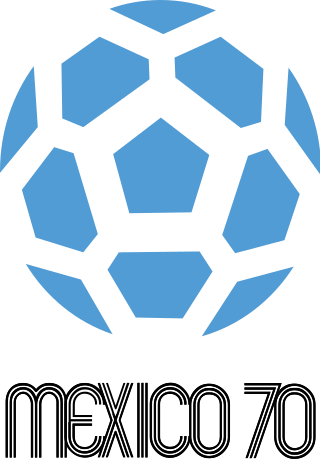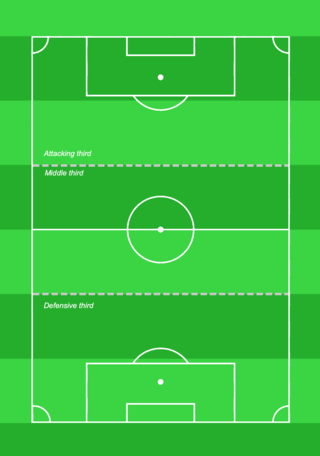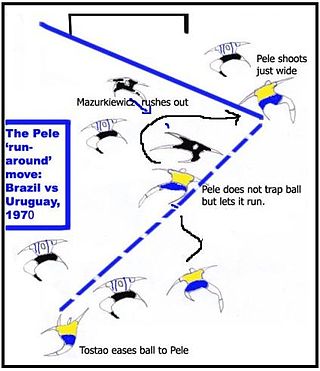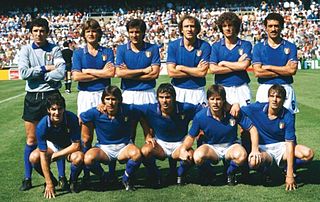
Edson Arantes do Nascimento, better known by his nickname Pelé, was a Brazilian professional footballer who played as a forward. Widely regarded as one of the greatest players of all time, he was among the most successful and popular sports figures of the 20th century. In 1999, he was named Athlete of the Century by the International Olympic Committee and was included in the Time list of the 100 most important people of the 20th century. In 2000, Pelé was voted World Player of the Century by the International Federation of Football History & Statistics (IFFHS) and was one of the two joint winners of the FIFA Player of the Century. His 1,279 goals in 1,363 games, which includes friendlies, is recognised as a Guinness World Record.

The Brazil men's national football team, nicknamed Seleção Canarinha, represents Brazil in men's international football and is administered by the Brazilian Football Confederation (CBF), the governing body for football in Brazil. They have been a member of FIFA since 1923 and a member of CONMEBOL since 1916.

The 1970 FIFA World Cup was the ninth edition of the FIFA World Cup, the quadrennial international football championship for men's senior national teams. Held from 31 May to 21 June in Mexico, it was the first World Cup tournament held outside Europe and South America, and it was also the first held in North America. Teams representing 75 nations from all six populated continents entered the competition, and its qualification rounds began in May 1968. Fourteen teams qualified from this process to join host nation Mexico and defending champions England in the 16-team final tournament. El Salvador, Israel and Morocco made their debut appearances at the final stage.

The 1986 FIFA World Cup was the 13th FIFA World Cup, a quadrennial football tournament for men's senior national teams. It was played in Mexico from 31 May to 29 June 1986. The tournament was the second to feature a 24-team format. Colombia had been originally chosen to host the competition by FIFA but, largely due to economic reasons, was not able to do so, and resigned in 1982. Mexico was selected as the new host in May 1983, and became the first country to host the World Cup more than once, after previously hosting in 1970.

Carlos Alberto "Capita" Torres, also known as "O Capitão do Tri", was a Brazilian football player and manager who played as an attacking right-sided full-back or wing-back. A technically gifted defender with good ball skills and defensive capabilities, he is widely regarded as one of the best defenders of all time. He also stood out for his leadership, and was an excellent penalty taker. Nicknamed O Capitão, he captained the Brazil national team to victory in the 1970 World Cup, scoring the fourth goal in the final, considered one of the greatest goals in the history of the tournament.

Team tactics as well as individual skills are integral for playing association football. In theory, association football is a very simple game, as illustrated by Kevin Keegan's namely assertion that his tactics for winning a match were to "score more goals than the opposition". Tactical prowess within the sport is nonetheless a craftsmanship of its own, and one of the reasons why managers are paid well on the elite level. Well-organised and ready teams are often seen beating teams with more skillful players on paper. Manuals and books generally cover not only individual skills but tactics as well.

Roberto Rivellino is a Brazilian football pundit and former footballer. He was one of the stars of Brazil's 1970 FIFA World Cup winning team. Rivellino currently works as a pundit for Brazilian TV Cultura.

Jair Ventura Filho, better known as Jairzinho, is a Brazilian former professional footballer. A quick, skillful, and powerful right winger known for his finishing ability and eye for goal, he was a key member and top scorer of the legendary Brazil national team that won the 1970 FIFA World Cup. He is nicknamed The Hurricane in reference to the way his jersey would shake as he ran down the wing during his playing days. A versatile forward, he was also capable of playing in a variety of other attacking positions, as a main striker, second striker, or even as an attacking midfielder. Jairzinho was known for his large afro towards the later stages of his career, as well as his burst of pace, dribbling, ball skills, finishing ability, shot power and devastating strength due to his large muscular build.

Gérson de Oliveira Nunes, generally known as Gérson, is a Brazilian former association footballer who played as a midfielder. He won numerous national trophies with the club sides of Flamengo, Botafogo, São Paulo and Fluminense. He is widely known as being "the brain" behind the Brazil Football Team that won the 1970 FIFA World Cup in Mexico.
The Brazil Independence Cup was an international football tournament held in Brazil, from 11 June to 9 July 1972, to commemorate the 150th anniversary of the Brazilian Declaration of Independence. It was called the Minicopa by the Brazilians and the final was between Brazil and Portugal, in the Maracanã Stadium. Brazil won 1–0, with Jairzinho scoring in the 89th minute.

The 1983 FIFA World Youth Championship was the fourth edition FIFA World Youth Championship tournament, hosted from 2 June to 19 June 1983 in seven venues in Mexico — Guadalajara, Irapuato, León, Mexico City, Monterrey, Puebla and Toluca — where a total of 32 matches were played. Brazil U20 defeated Argentina, 1–0, at Mexico City's Azteca Stadium to claim its inaugural tournament title of five.
The Taça das Nações or "Little World Cup" was a football tournament played in Brazil in 1964 to celebrate the 50th anniversary of the founding of the Brazilian Football Confederation. Three international teams were invited, Argentina, Portugal and England, for the competition which was played in Rio de Janeiro and São Paulo during late May and early June.

The runaround move is a football move designed to get around an opponent, made famous by Pelé in the 1970 World Cup. The move involves letting a dribble or a pass from a teammate approach but allowing it run past the opponent, then sprinting around the opposing player to continue the attack.

The 1970 FIFA World Cup final was held on Sunday, 21 June, in the Estadio Azteca in Mexico City, to determine the winner of the 1970 FIFA World Cup. This final, between Brazil and Italy, marked the first time that two former world champions met in a final; Italy had previously won the World Cup in 1934 and 1938, while Brazil won in 1958 and 1962.

This is a record of Italy's results at the FIFA World Cup. Italy is one of the most successful national teams in the history of the World Cup, having won four titles, just one fewer than Brazil. The team was present in 18 out of the 22 tournaments, reaching six finals, a third place and a fourth place.
Listed below are the dates and results for the 1970 FIFA World Cup qualification rounds for the South American Zone (CONMEBOL). For an overview of the qualification rounds, see the article 1970 FIFA World Cup qualification.

Nine of ten members of the South American Football Confederation (CONMEBOL) have competed in the men's FIFA World Cup finals. National association football teams from CONMEBOL have won the tournament ten times, including Brazil's record five championships. CONMEBOL countries have hosted the finals five times.
The history of the Brazil national football team began with the team's first international match in 1914. Brazil played in the first FIFA World Cup in 1930. The Brazil national team has been successful throughout its history, winning the FIFA World Cup five times since 1958.

The Brazil–Italy football rivalry, also known as the Clássico Mundial in Portuguese or the World Derby in English, is a football rivalry between the national football teams of Brazil and Italy, two of the most successful football nations in the world, having achieved nine World Cups between them. They have played against each other five times in the World Cup. Most notably, the 1970 World Cup Final and the 1994 World Cup Final in which Brazil won 4–1 in the former, and 3–2 on penalties after a goalless draw in the latter, as well as the semifinals of the 1938 World Cup and the final second group stage match of the 1982 World Cup won 3–2 by Italy. They have also met at two FIFA Confederations Cups as well as the 1976 U.S.A. Bicentennial Cup Tournament and the 1997 Tournoi de France.

The Brazil–Uruguay football rivalry, also known as El Clásico del Río Negro, or Clássico do Rio Negro, is a highly competitive sports rivalry between the Brazilian and Uruguayan national football teams, and their respective set of fans. Association football is the most popular sport in both countries and they have a combined 7 FIFA World Cups and 24 Copa Américas between them. Both countries also have a very close proximity and border each other, Uruguay only has a population of 3.5 million and has a size of 176,215 km2, while Brazil has a population of 210 million and a size of 8,515,767 km2, making it the 5th largest country in terms of both population and size.
















